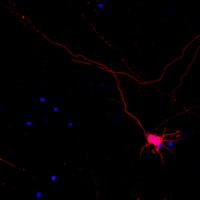Epigenetic changes in Alzheimer's disease: decrements in DNA methylation.
Diego Mastroeni,Andrew Grover,Elaine Delvaux,Charisse Whiteside,Paul D Coleman,Joseph Rogers
Neurobiology of aging
31
2009
Mostra il sommario
DNA methylation is a vital component of the epigenetic machinery that orchestrates changes in multiple genes and helps regulate gene expression in all known vertebrates. We evaluated immunoreactivity for two markers of DNA methylation and eight methylation maintenance factors in entorhinal cortex layer II, a region exhibiting substantial Alzheimer's disease (AD) pathology in which expression changes have been reported for a wide variety of genes. We show, for the first time, neuronal immunoreactivity for all 10 of the epigenetic markers and factors, with highly significant decrements in AD cases. These decrements were particularly marked in PHF1/PS396 immunoreactive, neurofibrillary tangle-bearing neurons. In addition, two of the DNA methylation maintenance factors, DNMT1 and MBD2, have been reported also to interact with ribosomal RNAs and ribosome synthesis. Consistent with these findings, DNMT1 and MBD2, as well as p66α, exhibited punctate cytoplasmic immunoreactivity that co-localized with the ribosome markers RPL26 and 5.8s rRNA in ND neurons. By contrast, AD neurons generally lacked such staining, and there was a qualitative decrease in RPL26 and 5.8s rRNA immunoreactivity. Collectively, these findings suggest epigenetic dysfunction in AD-vulnerable neurons. Testo completo dell'articolo | 19117641
 |
Epigenetic differences in cortical neurons from a pair of monozygotic twins discordant for Alzheimer's disease.
Mastroeni, D; McKee, A; Grover, A; Rogers, J; Coleman, PD
PloS one
4
e6617
2009
Mostra il sommario
DNA methylation is capable of modulating coordinate expression of large numbers of genes across many different pathways, and may therefore warrant investigation for their potential role between genes and disease phenotype. In a rare set of monozygotic twins discordant for Alzheimer's disease (AD), significantly reduced levels of DNA methylation were observed in temporal neocortex neuronal nuclei of the AD twin. These findings are consistent with the hypothesis that epigenetic mechanisms may mediate at the molecular level the effects of life events on AD risk, and provide, for the first time, a potential explanation for AD discordance despite genetic similarities. Testo completo dell'articolo | 19672297
 |










